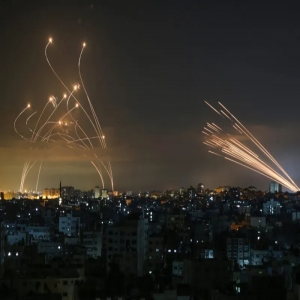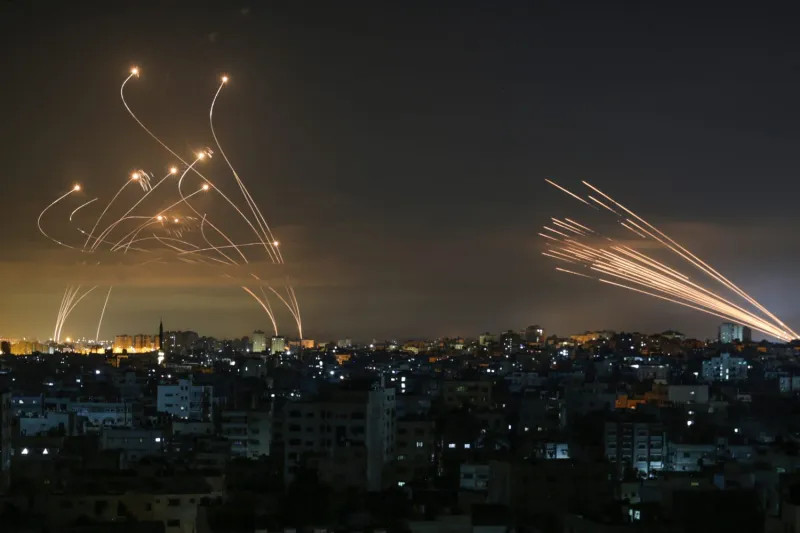

Countries across the world condemned the Hamas attack on Israel on October 7, 2023, killing innocent people and holding civilians as hostages. They supported the subsequent Israel attack on the hideouts of Hamas in Gaza to secure the release of hostages. Since then, a year has passed, and no solution seems to be in sight. The conflict between Gaza and Israel has only escalated, dragging the entire Middle East and the Gulf Region into the war zone, having the potential to break into a major world war involving America and other powers.
Initially, the impression was that the Israel Defence Forces were bombing the Hamas hideouts in Gaza to force them to release the hostages. However, since the start of the Israeli invasion of Gaza, some 41,500 Palestinians in Gaza have been killed, more than half of them women and children. Israel's tightened blockade cut off basic necessities, and attacks on infrastructure have caused healthcare collapse and an impending famine, engulfing the entire region. The Israel Forces have destroyed and damaged more than half of Gaza's houses, a third of its schools and universities, landmarks and the like. And almost the entire Palestinian population of 2.3 million in Gaza is forcibly displaced. It is a genocide, an unpardonable crime against humanity.
According to a UNEP assessment in June 2024, the damage caused to Gaza by the Israeli bombing is enormous: An estimated 39 million tonnes of debris have been generated by the conflict – for each square metre in Gaza, there is over 107 kg of debris. Debris poses risks to human health and the environment, from dust and contamination with unexploded ordnance, asbestos, industrial and medical waste, and other hazardous substances. The water, sanitation, and hygiene systems are almost entirely defunct in Gaza. Gaza is a ghost city.
Israel is fighting on multiple fronts in the Middle East – Gaza, Palestine in the West Bank, Syria, Lebanon and Iran – feeling insecure surrounded by the hostile Arab states that support the cause of Palestine, subscribing to the idea of "a war to end all wars," hoping to destroy all its enemies in the process. Prime Minister Benjamin Netanyahu believes that the war against Hamas, Hezbollah and the Houthis - Iran's regional allies that form the 'Axis of Resistance' against Israel for the cause of Palestine - cannot ensure the security of his country. He thinks Iran's influence over Iraq, Yemen, Syria and Lebanon is a threat to the Zionist state and that Iran's Supreme Leader Ayatollah Ali Khamenei, now 85, is holding on to the clerical regime that is weak. Netanyahu is not willing to accept the UN two-state Resolution that provides a lasting solution to the Israel-Palestine conflict and buys peace with the Arab states in the region. As C Raja Mohan, contributing editor on international affairs for the Indian Express, says, "Netanyahu is offering no concession at all on Palestine. In fact, the maps that he displayed at the United Nations don't even show the existence of Gaza and the West Bank."
In the past two weeks, Israel has adopted a more belligerent and aggressive position against Hezbollah. It killed Hassan Nasrallah, the chief of the Shia militant group Hezbollah in an airstrike in Beirut, Southern Lebanon, and several prominent leaders and top commanders of Hezbollah, hoping to cripple Hezbollah completely. This has outraged the Arab world, though not so much the Sunni Arab States like Saudi Arabia and the UAE. Iran has vowed vengeance for the death of Hassan Nasrallah, whom it described as a martyr. He was a close confidant of Iran's Supreme Leader. He helped to train Hamas fighters. Nasrallah "had long called for the liberation of Jerusalem and referred to Israel as a Zionist entity, maintaining that all Jewish immigrants should return to their countries of origin and that there should be one Palestine with equality for Muslims, Jews and Christians. "
Lebanon has endured deadly pager attacks and attacks on walkie-talkies engineered by Israel. And now, with these massive airstrikes by Israel, Lebanon is devastated. It is the worst moment in its history. During the past two weeks, Lebanon had suffered more than 1000 deaths, 6000 wounded, and a million people - one-fifth of its population – fleeing their homes to seek shelter in neighbouring Syria. Reacting to the airstrikes, the US security spokesman John Kirby said Israel's goal of making the northern areas of Lebanon safe from Hezbollah rocket fire and allowing thousands of displaced residents to return cannot be achieved with "an all-out war with Hezbollah, certainly not with Iran, is not the way to do that."
Israel was preparing a ground invasion of Lebanon. Hezbollah fighters are getting ready to confront any Israeli ground invasion. the group's deputy leader, Naim Qassem, declared: "We will face any possibility and we are ready if the Israelis decide to enter by land and the resistance forces are ready for a ground engagement." Netanyahu, in a wild threat to Iran, boasted that "there is nowhere in the Middle East we will not go to protect our people and our country."
Despite the worldwide anger against Israel's use of extreme force against Hamas and Hezbollah, Netanyahu now lent a political objective to his costly military campaign – regime change in Iran. He wants to overthrow the present regime in Iran. In his address to the Iranian People, he appealed to them not to "let a small group of fanatic theocrats" crush them. He reminded the Iranians of their older and enduring Persian identity. This amounts to a violation of Iranian sovereignty. It is an apparent provocation to the Islamic Republic of Iran.
On October 1, 2024, Iran, in retaliation, fired around 200 ballistic missiles at Israel, the worst bombardment in Israel's history. These missiles could reach the targets in just 12 minutes. Iran targeted three military bases of Israel and warned that if Israel retaliated, Tehran's response would be 'more crushing and ruinous', says a statement issued by the Islamic Revolutionary Guard Corps (IRGC) of Iran. Until now, Iran had avoided getting involved directly in the conflict with Israel. The US comes to the rescue of its ally Israel. A statement from the White House reads: "President Biden directed the US military to aid Israel's defense against Iranian attacks and shoot down missiles that are targeting Israel." According to a report in The Times of India (October 1), the US is sending troops to bolster security and to defend Israel, raising the total number of troops in the region to 43,000: "The increased presence will involve multiple fighter jets and attack aircraft squadrons. The additional personnel include squadrons of F-15E, F-16, and F-22 fighter jets and A-10 attack aircraft."
This is how America has been responsible for escalating the conflict in the Middle East to subserve its own strategic and geo-political interests rather than using its position to find a permanent solution to the Israel-Palestine conflict. Of course, Israel is defying the international community and the UN and refusing to enter into any ceasefire agreement. It is emboldened by the massive military aid it receives from the US. It boasts of being a super military power with advanced technology in military warfare. However, the Iran armed forces are three times that of Israel. The Lebanese are ready to resist Israeli forces: "Not just Hezbollah, all of Lebanon will fight this time. All of Lebanon is determined to fight Israel for the massacres it committed in Gaza and Lebanon." This leaves the Middle East on the brink of an all-out war.
It is high time Israel learnt a lesson to live in peace and harmony and co-exist with the neighbouring Arab states. It might have had a glorious past hundreds of years ago, but it must accept the reality of today's geo-political conditions. It can't afford to be ambitious of expanding its geographical area by forcefully occupying the Palestinian land and the territories of other states and then claiming them to be its own. It is like the Rashtriya Swayamsevak Sangh's (RSS) notion of establishing 'Akhand Bharat' – a unified Greater India - that would include the SAARC countries, Tibet and Myanmar, which were part of India at one time or the other in her long history – be it Ashoka's ancient Mauryan Empire or the Medieval Mughal Empire or the modern British Empire.
There is something called morality and ethics governing the conduct of relations among the community of nations. Military might can never justify coveting others' land. There is nothing to feel pound about aggressive nationalism and jingo patriotism that self-destructive, ambitious autocratic rulers, with a tunnel vision, pursue and create mass hysteria to make the people believe that they are an exclusive superior race or community. It is a petty, narrow, dangerous worldview. All that the militant Islamic Hamas who rule Gaza want is a solution to the long pending Palestine issue.
The West always applied double standards in conducting international relations. It is a bombastic idea to talk of nuclear non-proliferation and say that no country should become a nuclear power while the Big Five nuclear powers retain all the nuclear arsenal, leaving a huge void in the global balance of power. The best way to deal with the threat of the Islamic fundamentalists – like ISIS – is to understand them. They think the West imposes its way of life on non-Western countries - be it the capitalist mode of economy, the Western mode of governance, or its value system. It is this that they resist.
The world watches the naked aggression of Israel in the Middle East. A tiny country should not be allowed to hold the world to ransom. In its search for identity and security, Israel is perpetuating insecurity and instability in the whole region while peace eludes it, facing an existential crisis of its own making. The people of Israel are also traumatised and not allowed to live in peace either. The UN Secretary-General Antonio Guterres condemns the "broadening of the Middle East conflict, with escalation after escalation" and wants this to stop. He is now banned from entering Israel and declared a persona non grata.